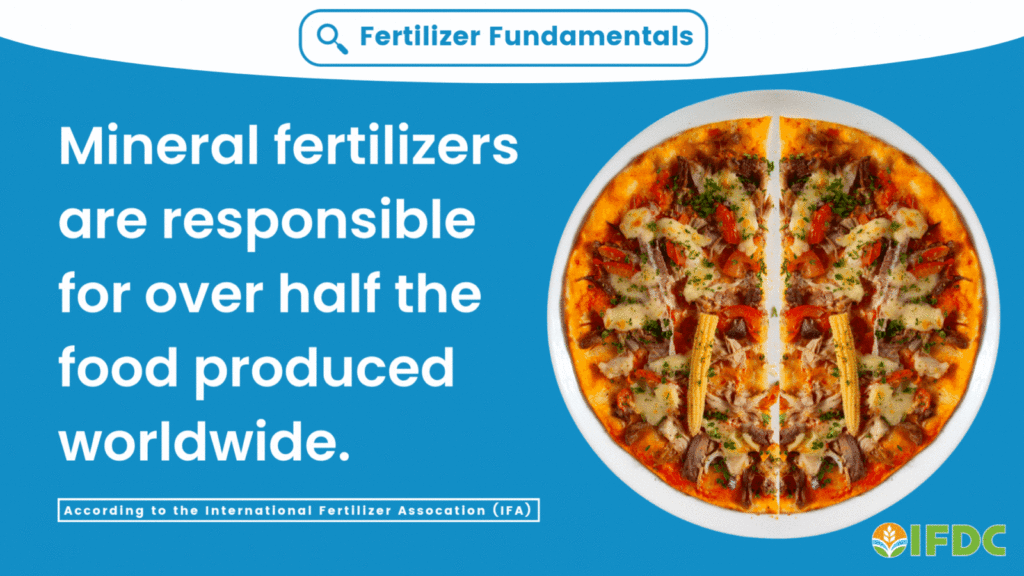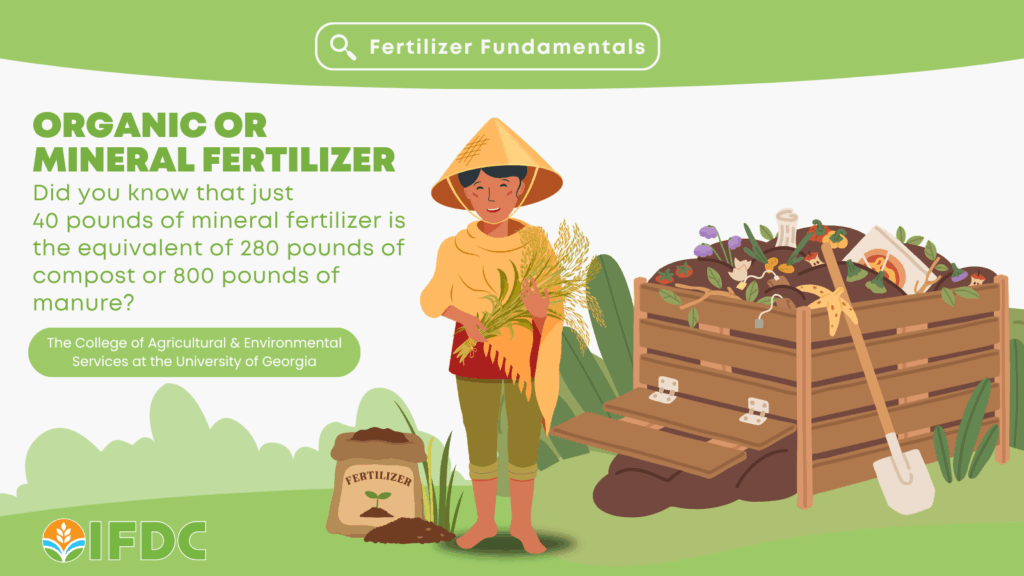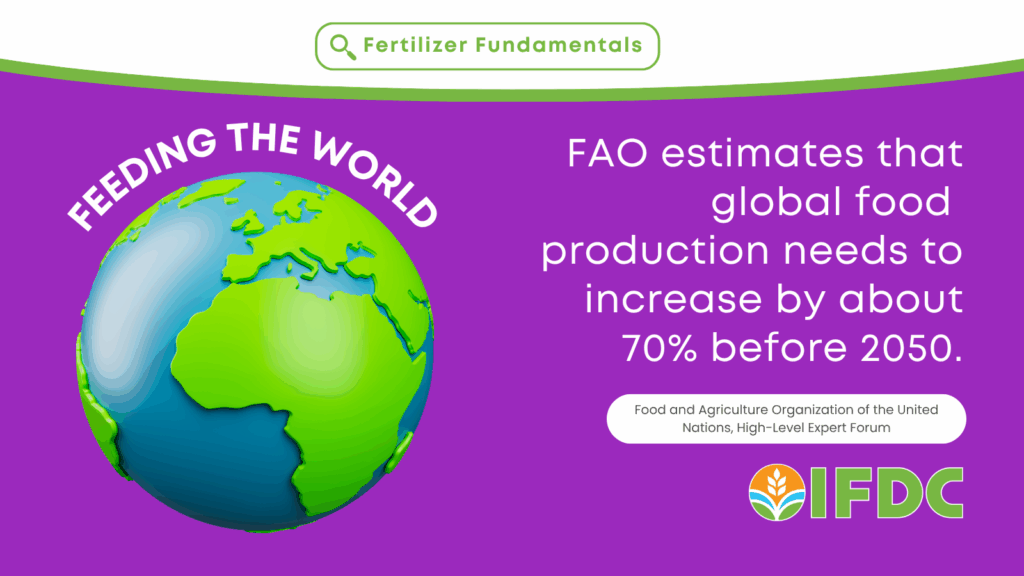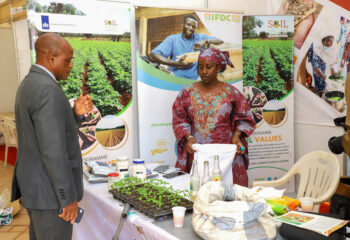
The International Fertilizer Development Center (IFDC) is returning to its roots to highlight the crucial role that fertilizers play in facilitating access to delicious and nutritious food. Many IFDC programs focus on increasing agricultural productivity, which would not be possible without the judicious application of fertilizer.
In this article, we will explore five key facts that help us to better understand fertilizers and their importance. Whether you are a seasoned farmer or just curious about where your food comes from, these insights will shed light on how fertilizers help to sustainably feed the world.
1. Fertilizer replenishes vital nutrients in soils and plants.
Fertilizer is any material either of organic or synthetic origin that provides nutrients, such as nitrogen, potassium, and phosphorus, to the plant.
Plants uptake mineral nutrients from the soil. Conventional cropping systems promote high productivity but do not always replenish nutrients in appropriate amounts that are removed at crop harvest. Continuous crop cultivation of the crop without proper use of fertilizer could cause nutrient depletion from the soils, commonly called nutrient mining. As a result, soils can become low in nutrients that plants need to grow and be more nutritious. Precise application of fertilizers, specifically crop- and location-adapted blends can revitalize soils and improve plant nutrition, benefiting people and planet.
2. Fertilizers come in different forms.
Mineral fertilizers are industrially produced from natural resources, such as the air (nitrogen) or mines (phosphorus and potassium), and they contain nutrients in concentrated forms and precise measurements. Organic fertilizers, on the other hand, are derived from plant or animal matter, including compost and manure. Organo-mineral fertilizers combine organic and mineral elements to provide a balanced approach to soil enrichment while allowing for control of nutrient content.
Plants uptake available nutrients from the soil in an elemental form, regardless of the type of fertilizer they come from. This means plants are willing to get their nutrition from 40 pounds of mineral fertilizer or 800 pounds of manure—they do not distinguish between types. Selection of fertilizer type and ratio is critical to improving soil fertility and keeping soil healthy.
The African Union’s African Fertilizer and Soil Health 10-Year Action Plan emphasizes that fertilizers, regardless of their type, are crucial tools for supporting food production and enhancing soil health. By making fertilizers available and promoting nutrient use efficiency through the balanced application of otherwise-limited nutrients, we can ensure that soils remain fertile and productive for generations to come.

3. Over half of the food produced worldwide is available thanks to mineral fertilizers.
According to the International Fertilizer Association (IFA), mineral fertilizers play an indispensable role in feeding the world, accounting for 50% of global food production. This statistic is even higher when organic and organo-mineral fertilizers are considered.
The nutrients currently available in the world’s soils are insufficient to support the crops we need to grow to feed the world. Fertilizers provide essential nutrients that promote plant growth and productivity, maintaining soil health and increasing agricultural output. Fertilizers help make food available to reduce global hunger.

4. Fertilizer isn’t good or bad. It depends on how well people use it.
While fertilizers are essential to meet the nutrient gap between soil supply and plant removal, improper use can harm the environment and contribute to global warming due to increased greenhouse gas (GHG) emissions. However, the problem is not the fertilizer, but how people use it.
The 4Rs of Nutrient Stewardship—using the Right Source, at the Right Rate, at the Right Time, and in the Right Place—ensure sustainable agricultural productivity and reduce farming costs while maximizing nutrient use efficiency and minimizing environmental impact.
Farmers across many regions lack the right amounts of the right types of organic matter for organic and organo-mineral fertilizers, making it difficult to rely solely on them to maintain soil fertility. In addition, organo-mineral fertilizers are not widely available in many parts of the world.
Organic fertilizers such as compost can require large amounts of biological material. Sourcing or producing organic fertilizers on a large scale can be challenging, especially in areas with limited resources and a high transport cost due to low plant nutrient content compared to mineral fertilizers. In such cases, mineral fertilizers can help bridge the gap between effort and impact by supplementing or replacing organic nutrients. In fact, a 40 pound bag of mineral fertilizer can replace 280 pounds of compost or 800 pounds of manure.

5. The FAO estimates that global food production needs to increase by about 70% before 2050.
The Food and Agriculture Organization (FAO) of the UN estimates that global food production must increase by 70% by 2050 to feed a projected population of nearly 10 billion. Fertilizers improve soil health and plant nutrition, boosting agricultural productivity. Nutrients in fertilizers help crops grow, increase yields, and protect uncultivated lands. As global demand for food increases, fertilizers can help farmers sustainably intensify production, reducing the need for expanding farmland while preserving natural ecosystems. This increased productivity is essential to achieving food security and ensuring that everyone has access to nutritious food.
Want to continue learning about the basics of fertilizer? Take our Fertilizer Fundamentals quiz today!




